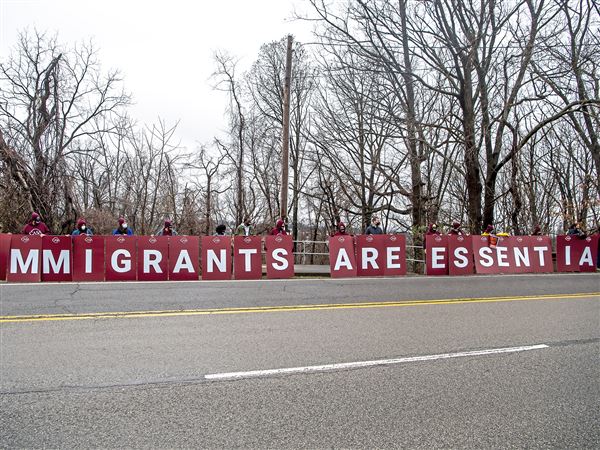WASHINGTON -- The Obama administration faced a fresh challenge to its health care law just as many of its key provisions took effect Wednesday, after an eleventh-hour Supreme Court ruling temporarily allowed some Catholic groups not to cover birth control in their employee health plans.
The requirement that employers cover contraception and related medications and procedures has been one of the most controversial parts of the Affordable Care Act, leading to dozens of lawsuits from groups that say it violates their religious freedom. The Supreme Court will hear arguments on the issue this year.
The decision came on the eve of what administration officials described as a landmark moment, as new health insurance policies began for about 6 million Americans who were set to receive coverage under the law.
Hospitals nationwide reported a relatively quiet day, without any surge of newly insured people filling emergency rooms with pressing medical needs. The White House reported no problems.
Wednesday also marked the start of some of the law's most popular provisions, such as one that prevents insurance companies from rejecting people who have pre-existing conditions. And it was technically the first day that most Americans must have health coverage or pay a fine, although the law includes a three-month grace period.
But those developments were overshadowed by the latest twist in the controversy over the contraception mandate. The provision requires that most employers provide health plans that cover an array of medications and procedures -- including the birth control pill, the morning-after pill and permanent measures such as tubal ligation -- without a copay.
As recently as Tuesday, the head of the U.S. Conference of Catholic Bishops complained in a letter to President Barack Obama that some people have gotten reprieves from aspects of the law, but not those who oppose the mandate.
The legislation "harshly and disproportionately penalizes those seeking to offer life-affirming health coverage in accord with the teachings of their faith," Archbishop Joseph Kurtz wrote.
Justice Sonia Sotomayor issued the stay late Tuesday. It came at the request of an order of nuns from Colorado, who said the rule violated their religious freedom. The Roman Catholic Church opposes artificial birth control.
The ruling applied not only to the Little Sisters of the Poor, a nonprofit that provides services to low-income elderly people, but also to more than 200 other faith-based groups that use insurance offered by the Christian Brothers Employee Benefit Trust, which adheres to Catholic principles. Most nonprofits that challenged the mandate had received temporary reprieves.
The injunction could expire as soon as Friday, which is when Justice Sotomayor has asked for a response from the federal government.
The ruling did not apply more broadly. The vast majority of Catholic dioceses and other groups that oppose the contraceptive mandate did not go to court over it, and thus must provide the coverage or be fined.
The legal battle against the mandate has proceeded on two fronts. One has involved religious-oriented nonprofits, such as the one run by nuns. The other has concerned corporations whose owners say that providing insurance that covers some contraceptives -- or any contraceptives at all, according to some of the lawsuits -- violates their religious beliefs.
The corporate complaints have advanced further and will be decided by the Supreme Court this year.
The cases involving nonprofits are not as far along, in part because the Obama administration offered an alternative that allowed women who work for nonprofit religious groups that object to birth control to receive coverage not directly paid for by their employers.
But about 45 religious nonprofits, including the University of Notre Dame and dozens of Catholic dioceses, still sued.
On Wednesday morning, the Little Sisters would have faced an agonizing choice were it not for Justice Sotomayor's decision, said Mark Rienzi, senior counsel for the Becket Fund for Religious Liberty and lead counsel representing the nuns. He said they would have had to commit a sin by signing a piece of paper asking their insurer to cover contraceptives -- or flout the law and incur significant fines.
"At the end of the day, they just can't be involved in certain things, and one of them is signing forms authorizing permission slips for these kinds of drugs," Mr. Rienzi said.
He added that he believes the decision is another indication that the courts will eventually throw out the mandate.
Catholic organizations affiliated with the dioceses of Pittsburgh and Erie were not under the same immediate pressure as the nuns in Colorado. Last month, U.S. District Judge Arthur J. Schwab issued a permanent injunction barring implementation of the health care mandate on contraception after it was challenged by the Catholic dioceses of Pittsburgh and Erie.
Unless Judge Schwab's ruling is overturned, the injunction allows nonprofits tied to the dioceses to continue to offer health insurance that doesn't include contraception, sterilization and abortion-inducing drugs.
Bishop David A. Zubik, who heads the Catholic Diocese of Pittsburgh, said the temporary order issued by Justice Sotomayor gives him hope that the Supreme Court will ultimately vindicate the position that the Catholic Church has taken.
"Obviously, there has been a string of hopeful signs for the position we've been advocating for," Bishop Zubik said Wednesday. "What is so significant about this temporary injunction is it has bumped up to the highest court of the land."
The issue is one of religious freedom, Bishop Zubik said.
"It is the issue of the government saying it doesn't matter what your religious beliefs are," he added.
The bishop said that the church's position has been misrepresented in the past.
"We've always been advocates for people to have health care." But, he continued, religious institutions should not have to provide services that go against their collective conscience.
In a statement Wednesday, the nuns said they are grateful for the reprieve but expressed anxiety that they may ultimately lose the case. "We hope and pray that we will receive a favorable outcome in order to continue to serve the elderly of all faiths with the same community support and religious freedom that we have always appreciated."
Women's reproductive rights groups, as well as the Obama administration, have argued that requiring most employers to cover birth control protects women's health. On Wednesday, Cecile Richards, president of the Planned Parenthood Federation of America, defended the rule.
"Birth control is basic preventive health care for women," she said in a statement. "The Affordable Care Act ensures that women can access birth control without co-pays no matter where they work, just like any other kind of preventive care."
First Published: January 2, 2014, 4:35 a.m.














